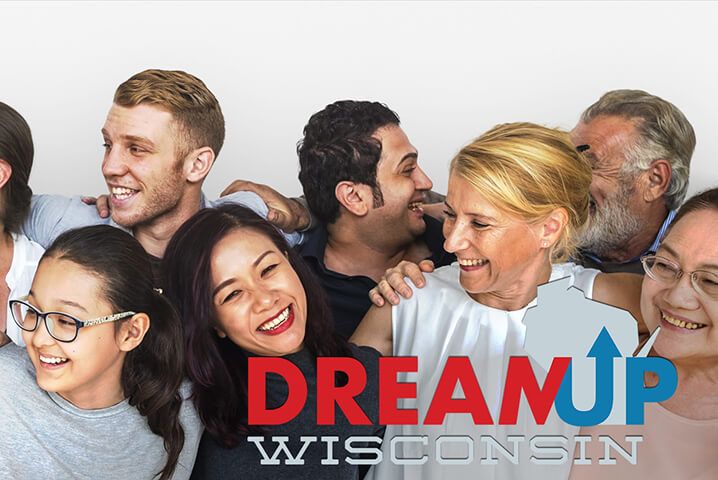The Alliance for the American Dream, a nationwide effort to support communities in need, is trying to grow the shrinking middle class — and UW–Madison is stepping up to help.
Through an alliance of schools including the UW, Ohio State University, Arizona State, and the University of Utah, the Alliance is trying to grow the net household income by 10 percent for 10,000 families by 2020. The Institute for Research on Poverty (IRP) at UW–Madison is overseeing Madison’s participation through the DreamUp initiative. In Dane County, the median household income is $65,000 a year, but is less than half that for the average Black family.
"DreamUp Wisconsin is a great example what can be accomplished when the university and community work together to address the needs in our community,” says Peng Her, the community relations coordinator for the Institute for Research on Poverty. “It brought nonprofit, technology business, governments, and venture philanthropy together to work towards a common goal. The DreamUp team at UW–Madison was inspired by the ideas and is grateful for the opportunity to help generate innovative ideas and solutions."
Schmidt Futures — whose chief innovation officer is UW alum Tom Kalil ’85 — developed and fully funded the Alliance, establishing a nationwide panel to host community meetings. The panel heard proposals from 12 community groups across the country on how they would achieve that 10 percent increase in net household income.
Through the DreamUp initiative, UW’s IRP screened proposals from Wisconsin-based groups. All of the proposals were required to focus on collaborating with University of Wisconsin campuses.
“We hope to reach out across all communities and make this as diverse as we can,” University of Wisconsin Chancellor Rebecca Blank told the online news outlet Madison365 when the program first launched last year. “Clearly there’s divisions by race, there’s divisions by ethnicity, [and] there’s divisions by geography when you look at incomes in Dane County. And one of the questions here is: do we have some ideas as to what would work across all of those different areas?”
In January, the Alliance panel met in Phoenix to listen to the pitches of the 12 proposal finalists that had been selected and chose five of them to advance in the competition. Two of those five finalists are from Madison and came to the competition through the UW’s DreamUp. In June, they flew to New York to make their pitch directly to Schmidt Futures head Erik Schmidt, who will either fund the proposals himself or help find funding for them. Both of the Madison finalists won funding for their ideas: Legal Interventions for Transforming Dane (LIFT Dane) tied for first place, earning $1 million; and We Care for Dane Kids tied for second, earning $300,000.
LIFT Dane is for people who are trying to better their income but have things holding them back, such as criminal records, lack of driver’s licenses, or other legal barriers to employment. LIFT is basically a database that draws from Wisconsin’s Consolidated Court Automation Programs and other similar sites in order to help people get their licenses reinstated or criminal records expunged.
We Care for Dane Kids is helping people handle the many costs of childcare. It provides education about things like the childcare tax credit, and it works with a number of care providers to share services. The group is also exploring how to increase the pay for childcare providers in order to give them a more livable wage, as well as hopefully expanding the number of childcare providers in Dane County.
Having both received funding, both organizations plan to begin work immediately on implementing their plans.
“The other thing that we’ve also done is we created an implementation match fund,” says Peng Her. “So it’s a two-for-one fund, meaning that for every $10 someone raises, we’ll match that $5. So if there are local funders who like these proposal ideas and say they’d like to donate $20,000, we would then have a matching fund of $10,000. So the idea is to spur some local support here to get these programs off the ground and running.”
But that was only round one. Her says round two is ongoing over the summer. The idea will remain the same: DreamUp will seek to increase the net household income of 10,000 families by 10 percent, this time by 2022. The finalists will again be narrowed down to five and will present before the review panel.
“We’ve had grad students and members of the community go out to interview people asking them what the biggest expenses are in their households,” Her explains. “One of the things that was different about this approach was that we really wanted it to be community-driven, and so our review committee was composed of mostly community folks and some university folks.”
In this first round of proposals, DreamUp reviewed 46 ideas before narrowing them down to 11. Panel members are hoping to have even more this second time around. Anyone hoping to participate in the second round can find more information here.










